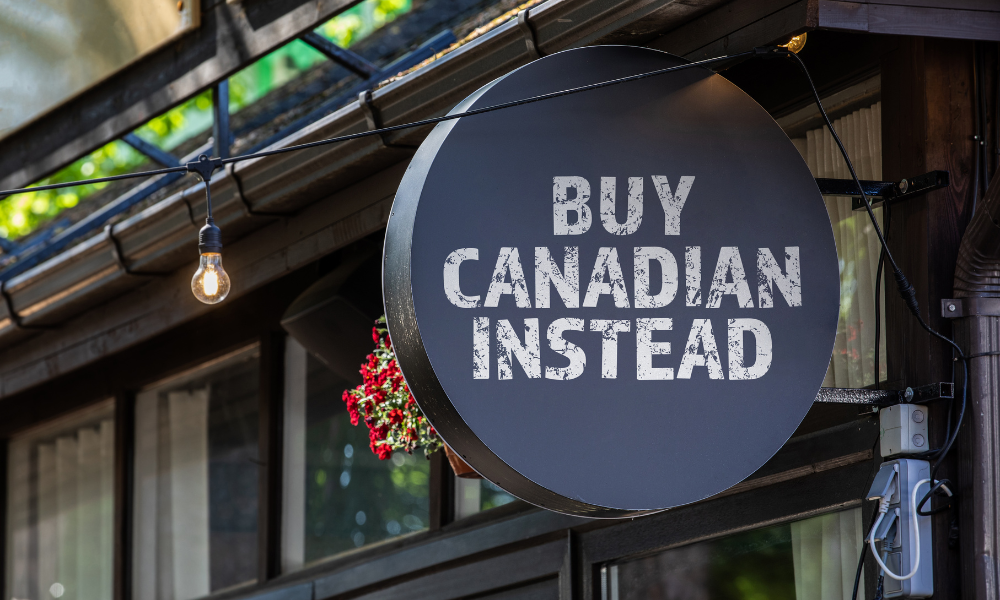Clients embrace 'Buy Canadian' sentiment, prompting advisors to balance emotion with portfolio goals

As Canadian clients react to US policy changes under US President Donald Trump, financial advisors are seeing a growing need to mediate between investor sentiment and long-term strategy.
According to The Globe and Mail, the “Buy Canadian” movement has moved beyond consumer habits and into investment portfolios, with some clients choosing to divest from US equities in response to political developments.
Toronto-based advisor Jonathan Rivard of Edward Jones said, “We have a saying: Don’t play politics with your portfolio.”
He noted that while investors may be influenced by headlines, his guidance remains focused on helping clients stick to their financial plans.
“If I was an institution such as the Canada Pension Plan, would I want to be making short-term decisions based on policy announcements or headlines? No, and, therefore, neither should you.”
This guidance comes amid rising client interest in Canadian-focused investments.
Statistics Canada reported $15.6bn in US stock divestments by Canadian investors in January—the same month Trump took office.
While some of this was likely profit-taking, the data reflect a growing unease toward US exposure.
Tim Nash, founder of Good Investing in Toronto, is encouraging clients to examine their portfolios through a national lens.
“The greatest antidote to despair is action and doing something about it,” said Nash. “Divestment is one side of the equation. The other side is, ‘How do I redirect that?’ That’s where it can get very exciting in terms of this notion of impact investing."
However, advisors like Kelly Gares of Blueshore Financial in West Vancouver are warning against decisions driven by emotion.
“Often, it’s a bit of an emotional response, this wanting to push back against this perceived negative push against Canada,” he said.
While some clients express political concerns through financial choices, Gares points out the risks of home bias, particularly Canada’s stock market concentration in financials, energy, and materials.
“Technology and health care make up a much smaller percentage of the [Toronto Stock Exchange],” he said, compared with the S&P 500 where technology comprises around 30 percent.
Bloomberg also reported a surge in flows to Canadian equity ETFs, reaching a four-year high following Trump's announcement of reciprocal tariffs.
“There are many clients that are saying, ‘I want to sell all my US positions’ because they don’t like what’s going on,” said Philip Petursson, chief investment strategist at IG Wealth Management, adding, “We’re advising against that,” according to Financial Post.
Advisors must also account for broader economic factors behind this shift.
According to BMO Capital Markets economist Robert Kavcic, the Buy Canadian movement could add $10bn annually to the economy, increasing growth by 0.3 percentage points.
But he cautioned that avoiding imports altogether is almost impossible, as 35 percent of household consumer goods rely on them directly or indirectly.
Client behaviour aligns with recent survey findings.
Dalhousie University’s Agri-Food Analytics Lab found more than 60 percent of Canadians are willing to pay 5 to 10 percent more for Canadian-grown produce, dairy, or meat.
Nearly 50 percent believe Canadian food is superior in quality and safety.
“These numbers signal a clear patriotic tilt in Canadian grocery aisles,” said Dr. Sylvain Charlebois, director of the Lab.
As per CityNews Toronto, in light of current market conditions, Vancouver-based Murray Leith of Odlum Brown is advising clients to maintain perspective.
He stated that “if your money is in the market, it should be longer-term money, because the market is not predictable in the short term.”
Leith also cautioned those nearing major expenses or retirement to reassess their stock exposure, noting that funds needed in under five years should not be in the market.
Despite volatility, Leith pointed out that the TSX has outperformed US markets, remaining flat compared to a 9 percent decline in the US.
He acknowledged challenges in the energy sector but maintained that energy stocks offer valuable cash flow and diversification.
“They provide great cash flow, and that’s an industry that, at the end of the day, despite what President Trump says, the US still needs and wants.”
Leith also referenced the pandemic as a case study in long-term thinking.
“If I had acted on those fears and told people to pull out of the market, people would have lost out on a lot,” he said, pointing to the 30 percent rise in stock prices and housing costs that followed.
As patriotic sentiment continues to shape client attitudes, financial advisors are challenged to provide balanced, strategic advice—grounded in diversification and long-term planning rather than reactive decision-making.



